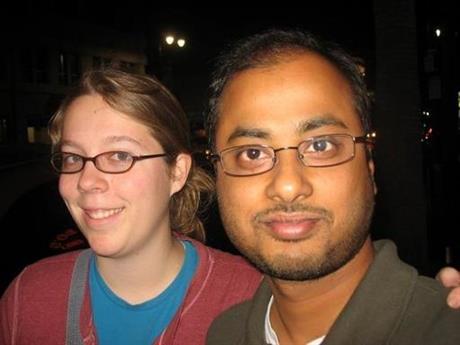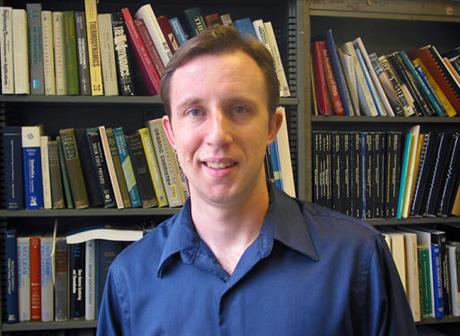- California Assembly OKs highest minimum wage in nation
- S. Korea unveils first graphic cigarette warnings
- US joins with South Korea, Japan in bid to deter North Korea
- LPGA golfer Chun In-gee finally back in action
- S. Korea won’t be top seed in final World Cup qualification round
- US men’s soccer misses 2nd straight Olympics
- US back on track in qualifying with 4-0 win over Guatemala
- High-intensity workout injuries spawn cottage industry
- CDC expands range of Zika mosquitoes into parts of Northeast
- Who knew? ‘The Walking Dead’ is helping families connect
UCLA killer turned violent despite foundation for success

This undated photo shows Ashley Hasti, left, and Mainak Sarkar, who police say carried out a murder-suicide at the University of California, Los Angeles on Wednesday, June 1, 2016.
LOS ANGELES (AP) — With a wall’s worth of academic degrees from top universities and a new wife in his chosen country, Mainak Sarkar entered mid-life with a foundation of success. Then his life began to unravel.
This week he snapped, and for reasons that investigators are still trying to understand gunned down those he once held close.
Authorities say Sarkar killed his estranged wife in a Minneapolis suburb then drove across half the country to Los Angeles and shot dead the UCLA professor who had helped him earn an engineering Ph.D.
As panic began to spread on the bustling UCLA campus, he turned the gun on himself.
He left behind devastated families and a shaken university community, a “kill list” that included the name of a second UCLA professor he felt had wronged him — and many unanswered questions.
Chief among them is what led him to violence. Police also have not detailed when they believe Sarkar shot Ashley Hasti after apparently breaking into the Minnesota home she shared with her father; whether he committed other crimes en route to California; or why he felt wronged by another professor on the “kill list” who was not on campus when Sarkar arrived with two semi-automatic pistols.
What soon became clear was that Sarkar believed the professor he killed, William Klug, had stolen code from him. In March, Sarkar posted online that Klug — the man he had praised in his 2013 dissertation as a mentor — had “made me really sick.”
Colleagues said only a deranged person could conclude someone of Klug’s character would defraud a student.
Even before his death, Klug had been hailed as a caring father and gifted educator who inspired his students. Hundreds gathered to honor him at on-campus vigils.
Klug’s outgoing personality contrasted with Sarkar’s introversion.
Where Klug smiles in pictures, Sarkar rarely does. As Klug’s career and family blossomed in his native Southern California, Sarkar struggled to finish his studies.
While at UCLA, Sarkar was “a nice guy going through the same anxieties and struggles as anyone else,” recalled Jeff Eldredge, a mechanical and aerospace engineering professor who was a close friend of Klug’s and helped review and later approved Sarkar’s dissertation.
Eldredge called Klug an exceptional person and teacher who had a gentle way giving feedback to students. Even so, Sarkar “didn’t take criticism well” when he submitted a dissertation that advisers returned, requesting significant revisions.
“He was rather combative in his responses,” Eldredge said. “He’d say, ‘I don’t know how to answer that’ or ‘I don’t know what that means.’ He was just very stubborn.”
Sarkar submitted a new document that was barely sufficient for Klug to urge colleagues to grant him a Ph.D. in 2013.
By then, Sarkar and Hasti had been married two years.
Hasti’s grandmother, Jean Johnson, said Sarkar was reserved and polite but couldn’t handle Hasti teasing him. Once, Johnson said, Sarkar called her and asked how he should respond to remarks Hasti made that bothered him. Johnson described Sarkar as acting like a 2-year-old; Hasti got on the phone and said she had just been joking.
“It was really hard to say ‘whoopee’,” Johnson recalled of the moment her beloved granddaughter shared that she would marry Sarkar. “I was dumbfounded. I said you’ve got to be kidding.”
Sarkar is not featured much in Hasti’s Facebook pictures. When he is, he’s not smiling, even when she is, her hand on his shoulder. In his own sparse Facebook account, Sarkar posted just a few photos of his wife. In some of those, he does smile.
Sarkar came to the U.S. on a student visa in 2001 after earning a degree in aerospace engineering from the Indian Institute of Technology at Kharagpur.
In India, former classmates and teachers described a solid student who gave no indication of aggression.
He attended Stanford University from fall 2003 until spring 2005, when he received a master’s degree in aeronautical and astronautical engineering, according to the university.
By 2006, he had moved south to UCLA.
It appears that 2014 was pivotal for Sarkar — a fulcrum year when his life tipped toward failure, despite being granted a green card to stay in the U.S.
Johnson said 2014 was when the couple split, though they did not divorce. It also was the year that Sarkar left his last known job, as an engineering analyst at an Ohio-based rubber company called Endurica
Company President Will Mars said Sarkar left that August, but declined to elaborate.
On Friday, Los Angeles police found a 2003 Nissan Sentra they believe Sarkar used to drive from Minnesota to Los Angeles.
Earlier in the day, UCLA’s engineering faculty met to discuss the shooting. No one could recall a sign that Sarkar would become violent.
“He went through something — all I can think is personal struggles the last few days, weeks or years that we weren’t privy to,” professor Eldredge said. “We assume, frankly, that he went through a psychological break that was pretty profound.”

This undated photo provided by the University of California, Los Angeles shows Bill Klug, a professor of mechanical engineering. Mainak Sarkar fatally shot Klug before taking his own life in a UCLA engineering building Wednesday, June 1, 2016











